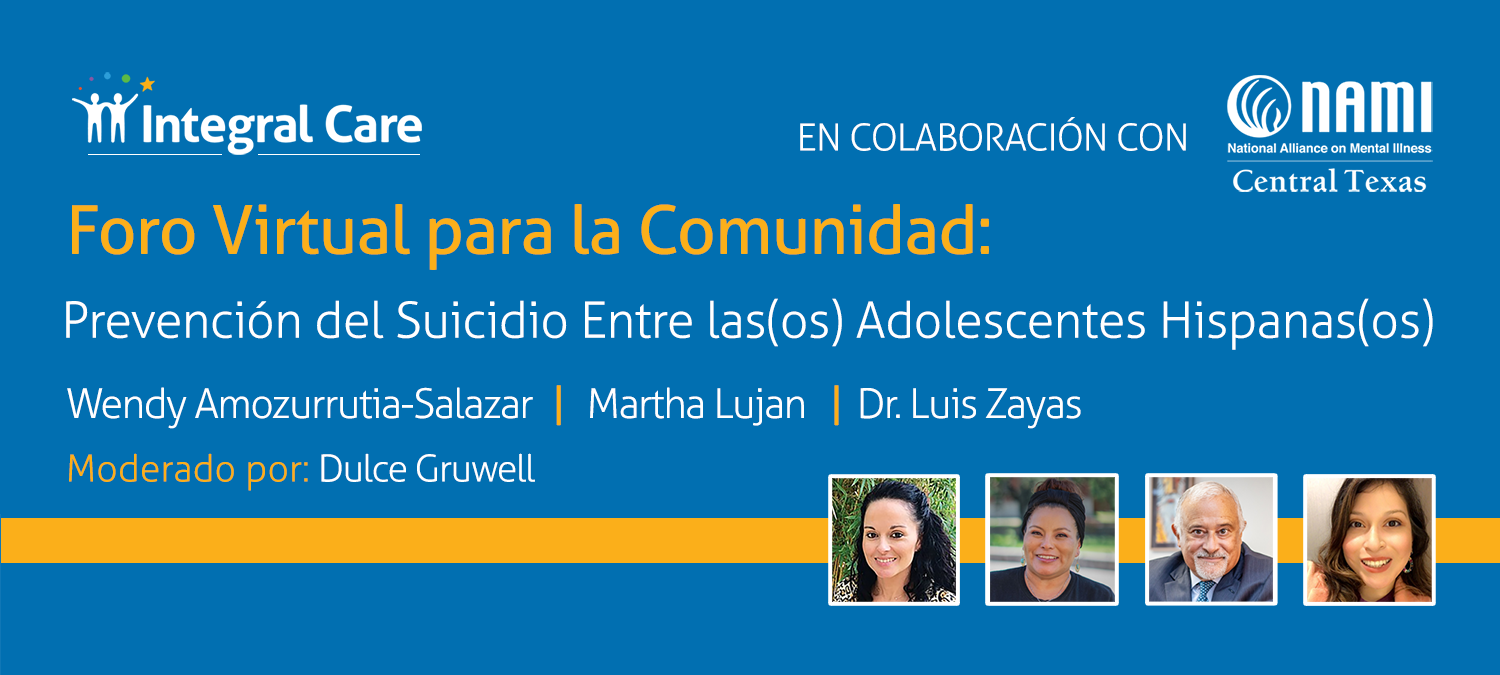November 2, 2022
Board of Trustees Meeting October 2022 Video
The recording of the October Board of Trustees Meeting is now available to watch here and on our YouTube Channel. https://youtu.be/h_2yi4KdiDM
October 24, 2022
Spanish Community Forum (Sept. 28) – Recap

Integral Care partnered with NAMI Central Texas to present “Meaningful Steps to Preventing Suicide Among Latinx Youth,” a Spanish community forum on youth suicide prevention. It addressed common stigmas around mental health in the Hispanic and Latinx communities, tips for having tough conversations around mental health and more.
Panelists and moderator were as follows:
- Dr. Luis Zayas of the University of Texas and Dell Medical School
- Wendy Amozurrutia-Salazar of Integral Care
- Martha Lujan of the UT Children Wellness Center
- Dulce Gruwell of NAMI Central Texas (moderator)
October 21, 2022
Board of Trustees Meeting 10/27
The October Board of Trustees meeting will be held in person at 1430 Collier St, Austin, TX 78704, and will be streamed online.
Webinar link: click here
September 26, 2022
Sept. 28 Spanish Community Forum:
On Wednesday, September 28th at noon, Integral Care and NAMI Central Texas invite you to join us for a virtual Spanish Community Forum – Meaningful Steps to Preventing Suicide Among Hispanic Youth. Experts from across Travis County will discuss the following topics – all from a Latinx perspective.
– – – – –
El miércoles 28 de septiembre a las doce del día, Integral Care y NAMI Central Texas lo invitan a unirse a un foro virtual para la comunidad completamente en español donde hablaremos acerca de los pasos significativos para prevenir el suicidio entre las(os) adolescentes hispanas(os).
August 31, 2022
INTEGRAL CARE LAUNCHES FY23-25 STRATEGIC PLAN
Integral Care is excited to kick off a new strategic plan that will guide our work for the next three years. Hear from our incredible team about what our new goals mean to them. READ FULL PLAN
August 24, 2022
Board of Trustees Meeting Live Webinar 8/25
Click here to watch the 8/25 Board of Trustees meeting live webinar.
Then, click the “Continue on this browser” button. The meeting starts at 5pm.
Disclaimer: While we’re working to expand our telecasting infrastructure, some capabilities are not fully active. At this time, please refrain from using the “Raise Hand” feature during the meeting. We appreciate your support as we continue to improve these capabilities.
July 27, 2022
Board of Trustees Meeting Live Webinar 7/28
Click here to watch the 7/28 Board of Trustees meeting live webinar.
Then, click the “Continue on this browser” button. The meeting starts at 5pm.
Disclaimer: While we’re working to expand our telecasting infrastructure, some capabilities are not fully active. At this time, please refrain from using the “Raise Hand” feature during the meeting. We appreciate your support as we continue to improve these capabilities.
June 15, 2022
Career Fair
Career Fair! Thursday, June 23rd, 2022
Are you interested in making an impact in Travis County? Join the leading local mental health authority in the state of Texas! Integral Care is hosting an in-person career fair on Thursday, June 23rd from 10 am to 3 pm. Stop by to explore our current openings and talk with our team. Learn more about our open positions:
integralcare.org/careers/
June 8, 2022
FY2021 Annual Report
The FY2021 Annual Report is here! Learn more about the impact we made on Travis County.
Funding from Humana will enable Integral Care to expand its existing food pantry at Terrace at Oak Springs (TAOS), a permanent supportive housing community that provides a home and wraparound services to 50 individuals who have experienced chronic homelessness and live with mental illness, substance use disorder, and other chronic health conditions.
Currently, the food pantry is open for residents once per month. Additional funding from Humana will enable Integral Care to purchase and stock sufficient food, hygiene items, and other supplies to open the food pantry once per week. This change in the pantry schedule will help ensure that TAOS residents have more frequent access to basic needs assistance, thereby reducing food insecurity, building health and well-being, and enhancing the stabilizing effects of housing.
Additionally, Integral Care plans to pilot a food delivery service for other clients receiving supportive housing services who do not have access to an on-site food pantry. This service will help to ensure that all residents of Integral Care apartment communities — including individuals with transportation barriers and low or no income — have their basic needs met with regular, dependable deliveries directly to their homes.
Sorry, no results were found, search again?
